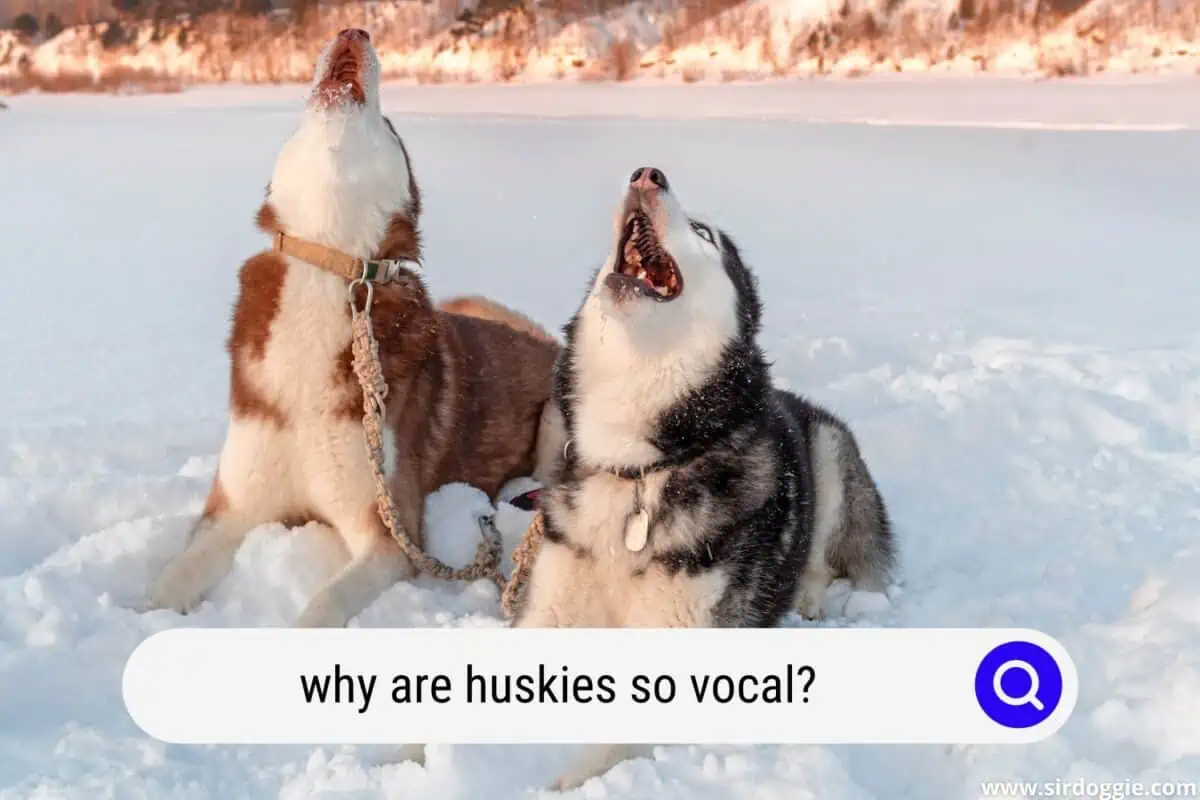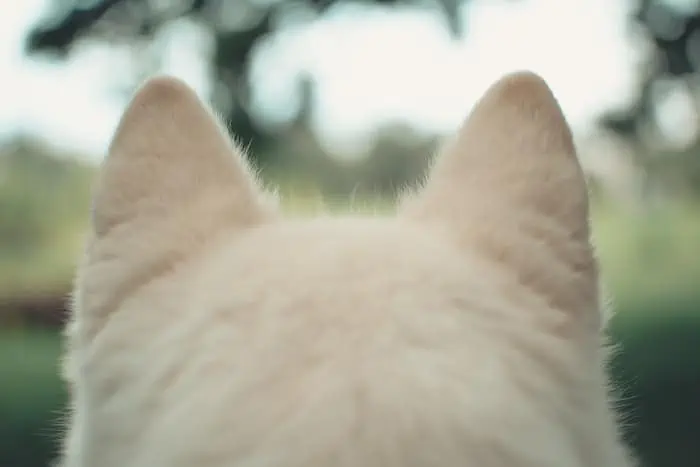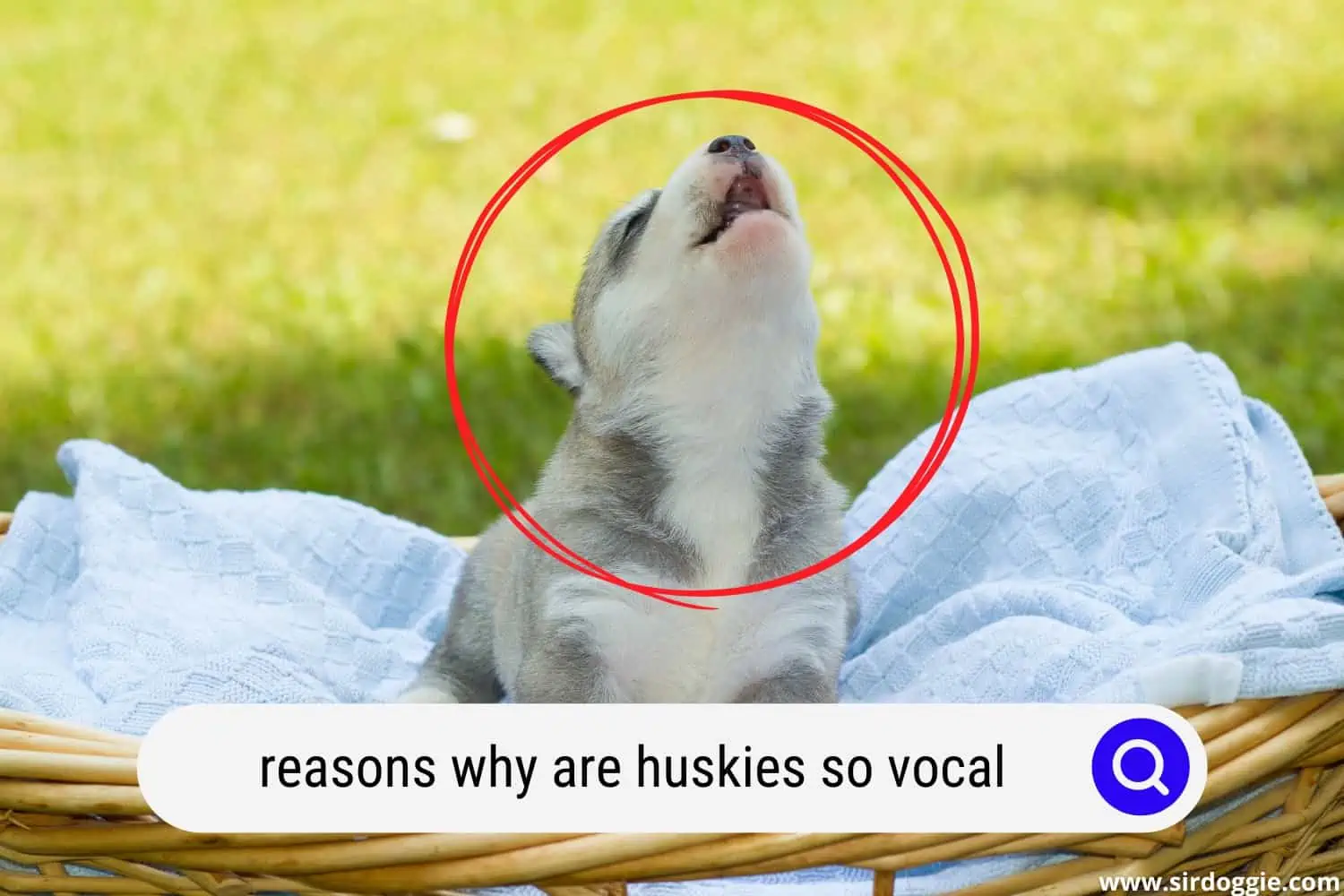11 Reasons Why Are Huskies So Vocal
It goes without saying that if you are the parent of a husky, you have undoubtedly experienced their overwhelming vocalizations. The noises and sounds that a husky makes include barking, whining, and talking. They may utilize these sounds to communicate and express a variety of different feelings!
Have you ever wondered why your husky is so loud and vocal, though?

A husky’s excessive vocal behavior is due to their genetics, as they are descended from wolves, and also due to their origins as sled dogs which had to communicate constantly since they lived in huge groups and packs.
Other reasons for a husky’s excessively talkative vocalization behaviors include the following:
- In reaction to another voice
- In response to pain
- In response to irregular, high-pitched sounds
- When the husky is ill and needs to communicate this to its owner
- Sharp ears (they can hear things that most humans cannot)
- They are experiencing separation anxiety and are stressed
- They are in good spirits and expressing joy
- Alerting that there are intruders
- You’ve been talking and howling along with it
Let us discuss these reasons in detail.
Related Reading: Does Husky Fur Grow Back? Read This First!
1. Genetics
As discussed above, it is in a husky’s genetics to be very vocal and talk or howl in every manner possible. This is due to their lineage that goes back to wild wolves that communicated in the same manner.
2. Huskies are pack dogs
A husky is a group dog, or pack dog, by nature. As a result, huskies are capable of a wide range of vocalizations, which they use to communicate with other pack members. When your dog is vocalizing at you all of the time, this is a sign that it is likely considering you to be a member of its family and is therefore exchanging information with you in the same way they would another husky. It’s critical to make an effort to comprehend this behavior rather than dismiss it; otherwise, the dog may conclude that you don’t approve of it.
3. Reacting to another voice
If you already own a husky and are watching a video scenario in which a wolf or another husky speaks, your husky may answer with a spoken response. This is a common occurrence.
In addition, if you haven’t had this experience with your husky before, show them a relevant YouTube video to try to elicit this response. It’s highly likely that they’ll be immediately captivated and will soon respond with a talking call of their own.
4. Responding to pain
They may be communicating with you to notify you that they are in pain or require something, whether assistance or something else applicable to the situation. You will most likely recognize the sound as being like a whine or a whimper in most cases. If you hear your husky whimper and pant, it is most likely that he is trying to communicate that he is in pain or discomfort of some sort.
5. In response to irregular, high-pitched sounds
When a high-pitched sound rings out and registers to them as a call for assistance, huskies will often vocalize in response to the sound. A child’s scream or the sirens of an ambulance are both excellent instances of audible signals that may get your dog howling and speaking.
However, while sirens and infant cries are not the same as other huskies’ calls for aid, they are still high-pitched signals of danger that might be misconstrued as a plea for help from some other husky by your own husky’s level of understanding.
Once again, instincts are at the root of everything. Even though your husky may have never known life as a member of a “dog pack” during any sled-dog days, they were still designed to behave in this manner from birth.
6. When the husky is ill and needs to communicate this to its owner
Just as a person’s pain, fear, or even tension might be communicated through their talking, if your husky is constantly mumbling to himself about nothing in particular, you may want to take them to the veterinarian to be checked for any potential health concerns that may be affecting them.
Even though Siberian Huskies are generally a healthy breed, their excellent health can still be jeopardized by genetic eye illness and canine hip dysplasia, among other things. Furthermore, there is also the risk for dogs to lash out in response to the agony they are experiencing due to their injuries, so it’s best to address these issues as early as possible.
Because both of these illnesses mentioned above are more common in huskies than in other canine breeds, you should be on the lookout for indicators of these conditions. Consider their talking and vocalizations in this particular context as yet another method of clear communication to alert you of something you need to assist with.
7. Sharp ears (they can hear things that most humans cannot)

It is well known that canines have far better hearing than humans in most situations. They can hear at a wavelength between 40Hz and 60,000Hz, whereas humans can only hear between 20Hz and 20,000Hz. Huskies are sled dogs, and they can detect the sound of even a rodent moving about in the snow from a long distance away thanks to their keen hearing.
The reason when your husky appears to have flown off the handle and is howling at what appears to be nothing at all is that there is a good probability it has detected something that you have not, and it is responding to that auditory stimulus. The hearing of huskies is incredibly keen, and they will react to sounds that you cannot hear throughout the day. There is no cause to be concerned or disturbed about anything once you realize this is what’s causing their constant vocalizations.
8. They are experiencing separation anxiety and are stressed
Dogs, like people, sometimes experience difficulties with attachment. The fact that its owner is absent for a significantly longer period than usual would undoubtedly cause a husky to feel ignored and lonely. This is why experts never recommend huskies as a dog for really busy individuals.
As a result of these feelings of abandonment (even though you’re simply gone a bit more or running late), they may experience stress, which they then may deal with by chatting in an attempt to summon you back to their vicinity. If you look for videos of huskies talking on the internet, you’ll find that they do it frequently when their owners aren’t there.
Huskies are gregarious and loyal canines who like being with other people. In a family system, the family serves as their very own pack. As a result, to keep them happy, a lot of care and devotion are required. The American Kennel Club refers to them as “outgoing,” which may explain their attachment difficulties since they don’t do well in isolation or without a lot of social interaction.
9. They are in good spirits and expressing joy
This is when things can become a bit perplexing. Pain, anxiety, and discomfort are not necessarily manifested in the form of conversations in all cases. On the other side of the spectrum, the high-pitched howl of a husky can also represent the happiness they are experiencing when they see a buddy they have not seen in a long time.
When a husky’s owner returns from work or a lengthy journey, they will notice a cheerful smile on their dog’s face and positive vocalization noises in their conversation. The sounds will not be the same as when they are trying to talk about grief or suffering. Every husky has a unique sound though, so it may take some time for their owners to learn what each vocalization means in different scenarios.
10. Alerting that there are intruders
As previously stated, your husky has incredibly sensitive hearing and is capable of detecting the presence of a stranger in the yard with ease. It will also howl if there are other invaders in your yard—whether these are dogs, bunnies, foxes, or cats—and it may try to get out of the house to chase them away. Because your husky is guarding its home and because tiny creatures arouse his hunting instincts, it will be tough to train him to stop acting aggressively. This also applies to unfamiliar humans approaching the home or being present in the yard.
11. You’ve been talking and howling along with it
Unfortunately, as with quite a few other behaviors, what was once charming while your dog was a puppy can quickly morph into something you wish you had prevented earlier in their growth. When your dog is young, howling and barking are entertaining to see and enjoyable to hear. However, as your dog grows older, their howling and screaming become much louder and can last throughout the night, causing you and your neighbors to be regularly disturbed. Getting your husky to stop doing something that he or she has done for most of his life is incredibly difficult, if not impossible.
Husky puppies and vocalization
When husky puppies are born, they begin to vocalize immediately. Puppy vocalizations are practically constant in all pups between 0 to 21 days and vary in intensity. When a litter of puppies is active, they will always produce some sort of noise, whether it be wailing, whining, barking, or sighing. Puppies will be very loud once their mother exits the whelping box or cage or if it is time for them to drink milk.
As your husky puppy grows older, his barking will become less constant and instead more aimed at certain circumstances or people in particular. Your husky pup will have an excellent variety of diverse noises by the time he is six months old!

FAQs
What can you do to train your husky to be less talkative?
Even though huskies are very intelligent and quick to pick up new instructions, they will always be loud and gregarious dogs. Training your husky to obey the commands “quiet” and “speak” while offering plenty of positive encouragement may help reduce some of the sounds they produce.
Do huskies maintain their high level of vocalization throughout their lives?
As huskies get older, they prefer to become less talkative, yet this does not indicate that there will ever be a time when they are not. The hearing range of older dogs begins to diminish, meaning they are also less inclined to answer to as many stimuli in their environment as they were in their youth. Senior huskies also have a propensity to become mellower as they become older. They’ll be less likely to demand your complete attention if you spend more time lazing outside or in that perfect warm spot with them.
Is it true that white huskies are less loud than other colors?
As previously stated, the predisposition to be noisy is a breed feature that is encoded in the genetics of a husky. The color of your husky’s coat (or the color of his eyes, for that matter) has absolutely no bearing on how loud he will be. Because there is no such thing as a quieter color of husky, you can expect some every day screaming, howling, and chatting if you choose this type of dog, no matter what it looks like.
What causes huskies to be so stubborn?
Huskies make a lot of noise and have a strong personality, which is why they are sometimes referred to as “stubborn dogs.”
As muscular and active dogs, huskies may be difficult to train and can be difficult to please. However, if you provide them with what they require each day, they appear to be extremely reasonable once their needs are met.
What is it about huskies that makes them so dramatic?
With that said, huskies also tend to be a little dramatic. They make a lot of noise, are outgoing, and have massive personalities.
This type of conduct is referred to as “reactive,” indicating that Huskies do not hesitate to act when presented with conditions that they do not like. Avoid putting children in those settings whenever possible, and you should notice a reduction in this type of behavior since most adults are more likely to grasp what the dog does and does not like.
What causes huskies to have blue eyes?
The quick answer is that it is simply genetics that cause many of them to have blue eyes. A deficiency of pigments causes the blue hue of the eyes in the same way as it occurs in humans.
Huskies are not the only canines with blue eyes, they are the most well-known for having them.
Do huskies get along well with children and babies?
Huskies are extremely loyal, loving, and active dogs, which makes them an excellent choice for families with children. However, each dog is unique in its way. It is suggested that you never leave your husky alone with a little child of any age.
Related Reading: Is It Cruel to Make Your Dog Howl?

Family Dog Expert Author
Hi there! I’m Stuart, a devoted dog lover and family dog expert with over a decade of experience working with our furry companions. My passion for dogs drives me to share my knowledge and expertise, helping families build strong, loving bonds with their four-legged friends. When I’m not writing for SirDoggie, you’ll find me hiking, playing with my beautiful dog, or studying music.